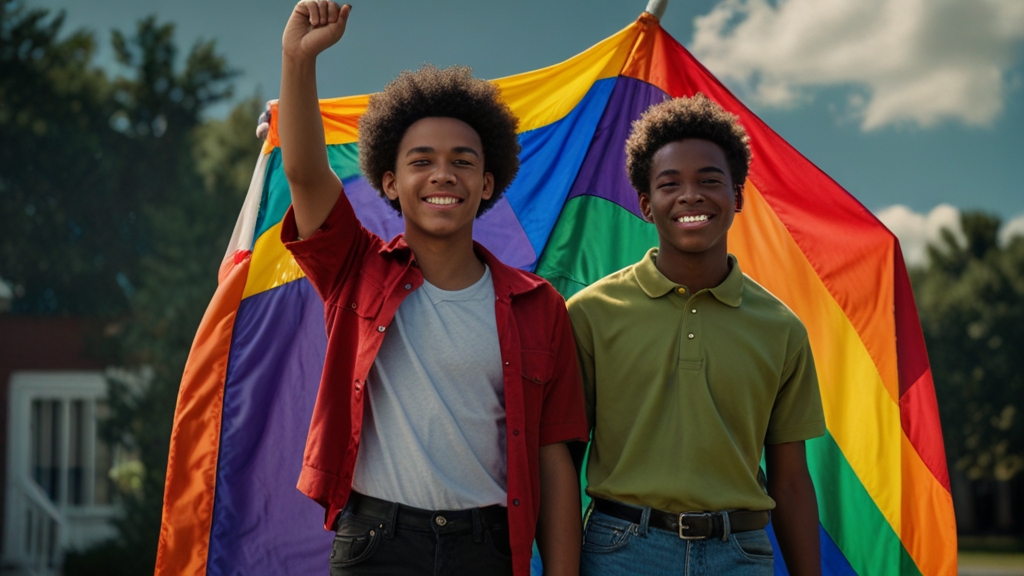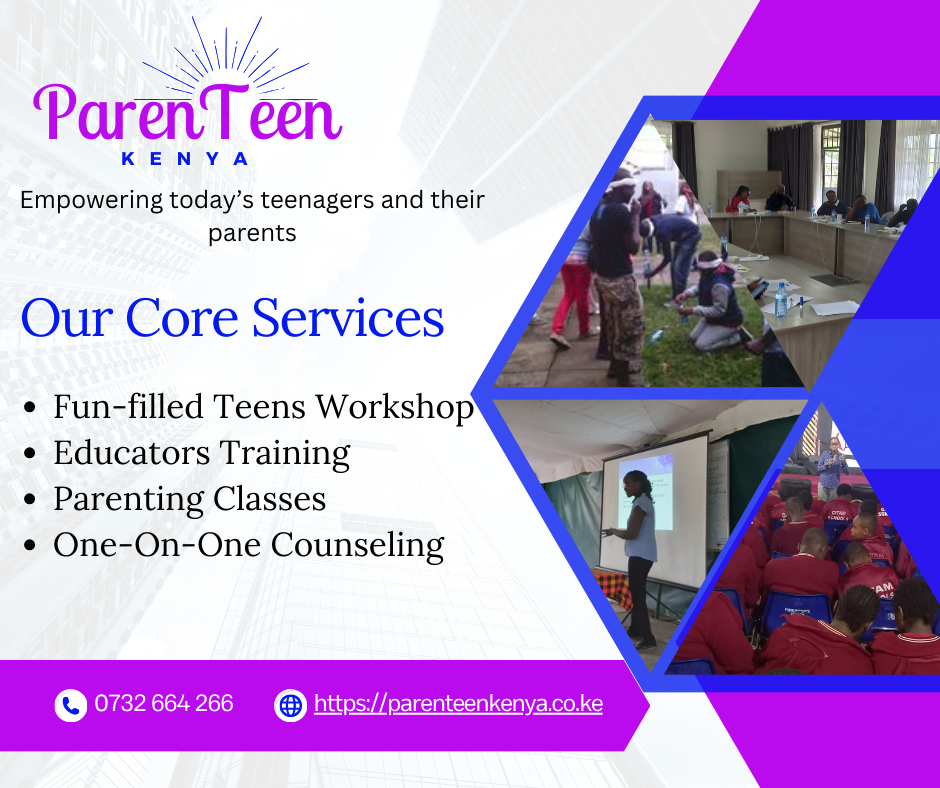As a parent, you may have noticed changes in your teenager’s behavior or heard conversations about sexuality that leave you concerned.
In Kenya, like many places, young people are exploring their identities in new ways. This exploration includes some teens showing interest in same-sex relationships.
It’s natural to feel worried or confused about this trend. You might wonder where these ideas come from and how they affect your child.
This article aims to help you understand the factors that may lead some Kenyan teenagers to explore gay or lesbian lifestyles.
By looking at different influences in their lives, from friends to the media, we can gain insight into this issue.
Our goal is to provide you with information to better support and communicate with your teen during this important time in their development.
1 – Peer Influence and Social Media

Lillian, a 16-year-old from Nairobi, spent hours scrolling through Instagram and TikTok. She initially followed fashion trends, dance challenges, and lifestyle influencers from around the world. However, her social media feeds began suggesting LGBTQ+ content creators who shared their coming-out stories and daily lives.
Curious, Lillian started watching these videos and soon found herself consuming more and more of this content. At school, her peers increasingly discussed LGBTQ+ topics and even suggested they explore them. Gradually, Lillian began questioning her identity and feelings, influenced by her constant exposure to these new ideas.
This story highlights how social media algorithms and peer influence can shape teenagers’ perceptions and behaviors, including their views on sexuality and gender identity.
In Kenya, young people are increasingly exposed to lifestyles that may conflict with traditional values through their online interactions and peer groups. This causes them to have the urge to adopt these lifestyles.
During adolescence, teens often seek validation and guidance from their friends.
If your teen’s social circle starts discussing or accepting LGBTQ+ identities, they may feel pressure to explore or accept these ideas themselves. More often, these ideas conflict with your family’s values or their own initial feelings.
Social media platforms have become influential in introducing and normalizing various lifestyles, including LGBTQ+ content. The following table shows popular platforms and their potential influence.
| Social Media Platform | Potential Influences |
| Visual storytelling and influencer culture | |
| Tik Tok | Short-form videos showcasing diverse lifestyles |
| YouTube | In-depth content on various experiences and ideologies |
| X | Discussions on various rights and activism |
These platforms can expose your teen to ideas and experiences that may be at odds with your cultural and family values.
As a parent, you should be aware of the content your teen consumes online and maintain open communication about these topics to help guide them through this potentially confusing developmental period.
2 – Search for Identity and Belonging
Adolescence is a period of significant change and uncertainty for many teenagers.
During this time, young people often struggle with questions about their identity and place in the world.
For some Kenyan teens, this search for identity may lead them to explore ideas and lifestyles that conflict with traditional values and expectations.
The search can make your teenager vulnerable to influences that may lead them away from the cultural and family values you’ve instilled.
In Kenya, where traditional views on sexuality and relationships are strong, some teens may find themselves drawn to ideas that challenge these norms.
These new ideas can be particularly concerning for parents who want to raise their children in accordance with their cultural or religious beliefs. Factors that may contribute to this problem for teens include:
- Lack of strong role models within the family or community
- Inadequate guidance on matters of sexuality and relationships
- Feelings of isolation or not fitting in with peers
- Exposure to conflicting messages from media and popular culture
These factors can create a sense of confusion and disconnection from the values.
Some teens may mistakenly believe that exploring alternative lifestyles will provide the sense of belonging or understanding they crave.
However, this exploration can often lead to further identity confusion and conflict within families and communities. Watch this video of a former lesbian lady explaining how her decisions affected her life and the underlying reason behind her choices.
3 – Exposure to Western Ideologies
John, a 17-year-old from Mombasa, loved watching American TV shows and movies. Most of the series he watched featured LGBTQ+ characters living openly and proudly. One day, while discussing a popular show with his friends, John found himself defending a gay character’s right to love freely. His friends were surprised by his passionate stance. Without knowing it, John had been deeply influenced by the media he consumed.
This scenario demonstrates how exposure to Western ideologies through media can shape your teen’s views on sexuality and relationships.
Globalization has made it easier than ever for young people to access content from around the world, exposing them to diverse perspectives and lifestyles.
The impact of Western media on Kenyan cultural values is significant, especially when it comes to topics like sexuality and gender identity.
Western societies often portray LGBTQ+ lifestyles as normal and acceptable, which can conflict with traditional Kenyan values. This exposure can lead teens to question their own beliefs and those of their community.
Some ways Western ideologies about sexuality influence Kenyan teens include:
- Normalizing LGBTQ+ relationships in entertainment media
- Promoting individual freedom and self-expression
- Challenging traditional gender roles and expectations
- Emphasizing the importance of personal happiness and fulfillment
Examples of Western media content that promotes LGBTQ+ lifestyles are:
- TV shows with prominent LGBTQ+ characters (e.g., Glee and Modern Family)
- Movies exploring LGBTQ+ themes (e.g., Love, Simon, and Moonlight)
- Music videos and songs by practicing LGBTQ+ artists or those in support
- Social media campaigns supporting LGBTQ+ rights and visibility
With these influences targeting your teenager, you face the challenge, as a parent, of helping your teen process these conflicting messages and develop the proper understanding of sexuality and relationships.
Related: LGBTQ+ Community Explained to The Kenyan Parent
4 – Personal Experiences and Trauma
Feli, a quiet 15-year-old from a small town in Kenya, had always felt different. She struggled to connect with her peers and often found herself lost in thought. What her classmates didn’t know was that Feli had experienced sexual abuse at a young age.
As she entered her teenage years, Feli found herself drawn to close friendships with other girls, feeling safer and more understood in their company. What Feli hadn’t realized was that her attraction to girls was related to her traumatic past.
Feli’s story highlights how personal experiences, particularly traumatic ones, can influence a teenager’s perception of their sexual identity. Various studies on correlation also support this.
While it’s crucial to note that trauma does not cause homosexuality, it can impact how individuals relate to others and understand their own sexuality.
Teenagers who have faced challenging or traumatic situations may find themselves questioning societal norms and exploring alternative lifestyles as a way of coping or finding comfort.
Some experiences that might contribute to a teen’s exploration of non-traditional identities include:
- Physical or emotional abuse from family members or peers
- Exposure to domestic violence
- Neglect or abandonment
- Sexual abuse or exploitation
- Bullying or social isolation
In cases where abuse or other traumatic events are present, it’s crucial to approach the situation with care and professional support.
Some teens may temporarily explore same-sex relationships or alternative gender identities as a response to their traumatic experiences. This exploration might be a way of:
- Avoiding painful associations with the opposite gender
- Seeking safety in relationships that feel different from those where they experienced trauma
- Attempting to regain control over their bodies and identities
- Coping with feelings of confusion or disconnection from their assigned gender
The importance of counseling and support for affected teens cannot be overstated. Professional help can assist teens in the following ways:
- Processing traumatic experiences
- Developing healthy coping mechanisms
- Understanding the impact of trauma on their perceptions and behaviors
- Exploring their identity in a safe, guided environment
- Reconnecting with their cultural and family values
By addressing underlying trauma and providing appropriate support, parents and caregivers can help guide their teens toward a healthy understanding of themselves and their relationships rooted in their cultural, religious, and family values.
As you get into the last reason, listen to the following video that will guide you on how to start talking about puberty and having the sex talk.
5 – Lack of Proper Parenting
The role of parenting in shaping a teenager’s values, beliefs, and behaviors cannot be overstated.
In some cases, a lack of proper parenting may contribute to teens exploring LGBTQ+ lifestyles.
This doesn’t necessarily mean that parents are negligent, but rather that they may struggle to provide the guidance and support their teens need in a rapidly changing world.
Some factors that may contribute to a lack of proper parenting in this context include:
- Limited communication about sexuality and relationships
- Absence of positive role models for healthy relationships
- Inconsistent or overly permissive parenting styles
- Lack of emotional support or connection with teens
When parents are absent, emotionally distant, or unable to provide clear guidance on issues of sexuality and relationships, teens may turn to other sources for information and support.
These sources, such as peers or the internet, may not always provide accurate or appropriate information.
Additionally, some parents may avoid discussing topics related to sexuality due to discomfort or cultural taboos.
This silence can leave teens confused and unsupported as they experience their emerging feelings and identities.
To address this issue, parents can:
- Nurture open and honest communication about sexuality and relationships
- Educate themselves about LGBTQ+ issues to better understand their teens
- Set clear boundaries while allowing age-appropriate independence
- Provide emotional support and unconditional love
- Seek professional help if needed, such as family counseling
It’s essential to recognize that even with the best parenting, some teens may still explore LGBTQ+ identities.
The goal of proper parenting in this context is to ensure that teens have a strong foundation of support, accurate information, and guidance as they form their identity.
ParenTeen Kenya Can Help
ParenTeen Kenya is dedicated to helping our clients navigate the challenges of raising teenagers in today’s world. We understand the concerns parents face when their teens struggle with issues related to sexuality and identity.
Our professional counselors offer therapy services tailored to help the teenager process the various issues or past childhood traumas they are going through. Book a session with us today.
Jane Kariuki is a devout Christian, Clinician, Psychologist, and founder of ParenTeen Kenya. She authored an exceptional training manual used in her teens’ workshop and an instructional guidebook for her parenting classes. If she is not training, blogging, or counseling, Jane loves to spend time with her sweet husband and three children.







